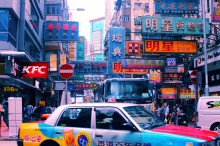Growing up in Guangzhou, China, merely a one-hour train ride away from Hong Kong, I developed a distanced love for Hong Kong rather early in my life. I was immersed in Hong Kong culture through its films, music, dramas, and cuisine, but the Hong Kong that was depicted by its artists was all that I knew. Many times, I transferred flights at the Hong Kong airport and stood in front of the clear glass that separated me from the mountainous view of the city, wondering when I could actually live and breathe within it.
It was not until last summer that I had that opportunity. Attending the Woodsworth College Summer Abroad program at Hong Kong University, I took a course on contemporary Chinese cinemas. From June to early July, after class, I took my time to “escape” into the city.
It’s effortless to escape in Hong Kong: take the tram from Central up to Victoria Peak and have the whole city under your eyes, walk down the Avenue of Stars in Tsim Sha Tsui alongside Victoria Harbour and enjoy the laser light performance on the harbour at night, or ride the Central–Mid-levels escalators that famously appeared in Wong Kar Wai’s Chungking Express (1994) and then stop by Lan Kwai Fong for a drink. Take your pick, and embrace the cosmopolitan, hypermodern Hong Kong as the world knows it.
And yet, it is precisely the ease of escaping that made me question that from which one escapes, and thereby submits to the glamorous façade of this urban jungle. What, or who, is the “real” Hong Kong? I bore that question when I sat alone in a small canteen for lunch, sharing the table with construction workers who came and went. The air was full of a sweaty smell, but at the same time vitalized by an endless, loud, and casual chatter—people’s daily discussions about their Hong Kong lives. I explored that question on July 1st, as I was in my dorm room writing about Hong Kong New Wave filmmaker Ann Hui’s Song of Exile (1990), a commentary on ambivalent Hong Kong identity after the British government officially signed Hong Kong over to PRC in 1984. Meanwhile, 400,000 protestors were marching down Central, expressing their dissatisfaction with Hong Kong’s current economic and social conditions on the symbolic fifteenth anniversary of handover day.
By the end of my journey, I found myself still upholding a distance from Hong Kong, as I had in my childhood, but it was a different kind of distance. Surely I could go on and on about Hong Kong’s charisma, as an experienced tourist and cultural gazer. Estranging me from that familiar narrative, however, is my confusion and concern towards the future of Hong Kong, with public expression against its governance rising. The question of Hong Kong identity is like the humid heat wave in the city during summer: always looming overhead, inescapable and unresolved.
Betty Xie is a fourth year student in Asia-Pacific Studies and Cinema Studies.
